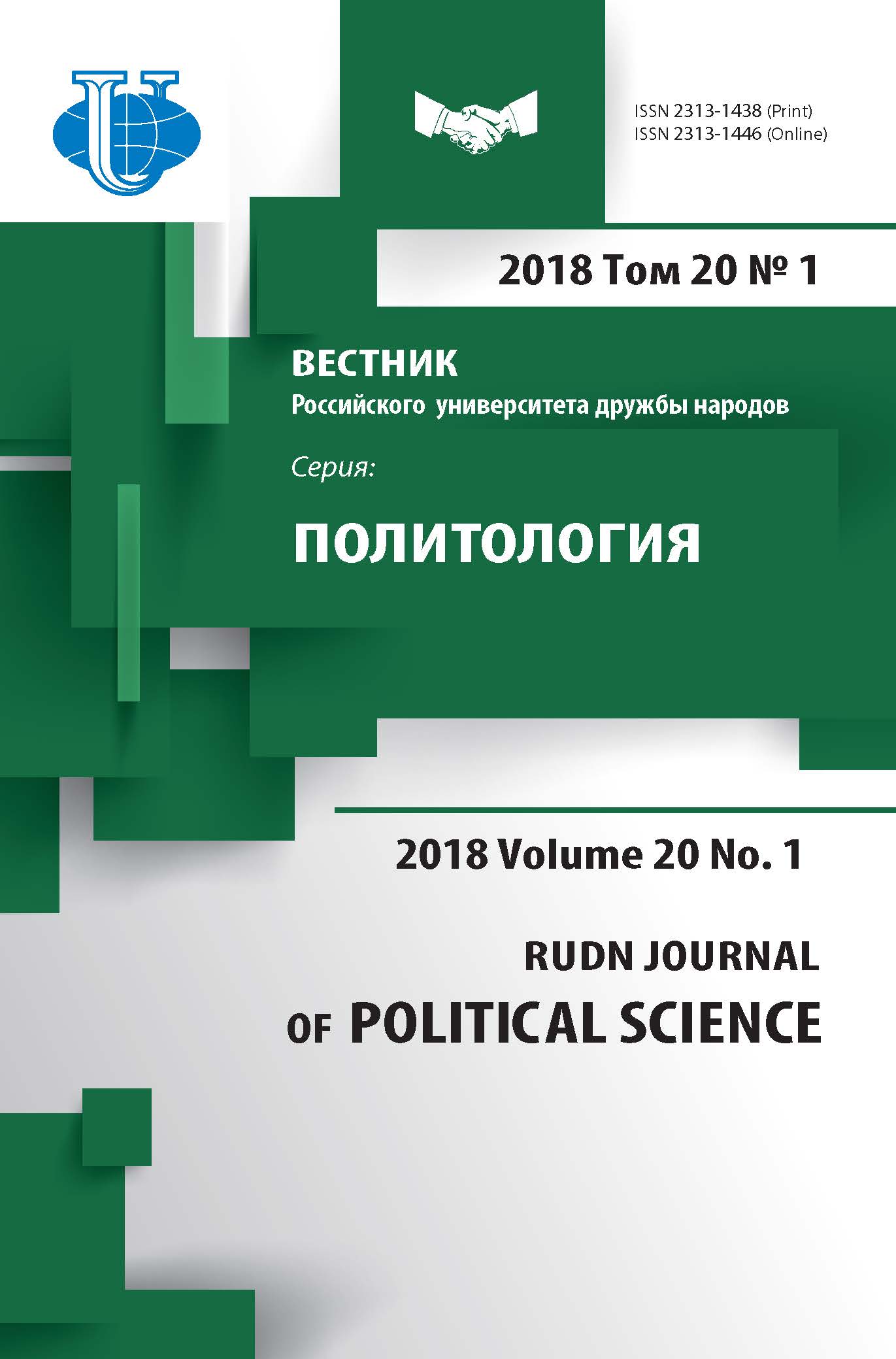Testing with Values: the Refugee Problem and Political Prospects of the “Alternative for Germany”
- Authors: Fedina A.V1
-
Affiliations:
- Moscow State Institute of International Relations (University) of the Ministry of Foreign Affairs of the Russian Federation (MGIMO-University)
- Issue: Vol 20, No 1 (2018)
- Pages: 76-88
- Section: CONTEMPORARY MIGRATION PROCESSES: POLITICAL DIMENSION
- URL: https://journals.rudn.ru/political-science/article/view/18131
- DOI: https://doi.org/10.22363/2313-1438-2018-20-1-76-88
Cite item
Full Text
Abstract
The article analyses the reasons for the electoral success of the “Alternative for Germany” party at the federal and state levels in 2016-2017. Looking at the ideological spectrum of German political parties through the research lens of a two-dimensional coordinate system that, alongside the traditional ideological dimension includes the value axis, the author points out the fact that the problem of the refugees, which appeals to the values of the nation, perplexed German parties, as the choice of a particular strategy in regard to the refugees involved high risks of losing a significant number of votes. As a result, those parties, which managed to clearly articulate their system of values, above all the “Alternative”, benefited from this situation. The author states that the rise of the “Alternative” was caused by the “value vacuum” in the party life in Germany stemming from the progressive “open-door” refugee policy introduced by Chancellor Merkel in order to resolve the European refugee crisis. Much consideration is given to the reasons that led the CDU to adopt such an unusual strategy for a predominantly centrist party. In conclusion the author suggests that, in spite of its electoral success, political influence of the “Alternative” will be seriously limited by the unwillingness on the part of other parties to establish contacts and build inter-party ties with an inexperienced political player, which is prone to neglect the achievements of German democracy and does not fit into the framework of modern political mainstream. From the other hand, the tightening of the immigration policy weakens the protest potential of German voters.
About the authors
Alyona V Fedina
Moscow State Institute of International Relations (University) of the Ministry of Foreign Affairs of the Russian Federation (MGIMO-University)
Author for correspondence.
Email: alyona.fedina@me.com
postgraduate student at the Department of Comparative Politics
Prospect Vernadskogo, 76, Moscow, Russia, 119454References
- Bicoev G.T. Tipologii sistem izbiratel'nyh organov. Izbiratel'noe zakonodatel'stvo i praktika. 2017; 1: 25—29. (In Russ).
- Ladygin M.S. «Al'ternativa dlja Germanii» — odno iz projavlenij nemeckih «novyh pravyh»? Vestnik Rossijskogo universiteta druzhby narodov. Serija: Politologija. 2017; 1: 60—68. (In Russ).
- Angela Merkel: Grenzen der Kanzlerin. Zeit Online. 30.03.2017. Available from: http://www.zeit.de/2017/14/angela-merkel-die-getriebenen-fluechtlingspolitik-robin-alexander/ komplettansicht.
- ARD-DeutschlandTREND. Februar 2016. Infratest dimap. Available from: https://www.infratest-dimap.de/umfragen-analysen/bundesweit/ard-deutschlandtrend/2015/august/.
- Der grüne Realist. Tagesschau. 13.03.2016. Available from: https://www.tagesschau.de/inland/ portraet-kretschmann-101~_origin-630b4951-3acc-4de9-8cda-9654f90b33f2.html.
- Deutschland übernimmt eine besondere Verantwortung für Flüchtlinge. Bundesministerium des Innern. 20.06.2014. Available from: http://www.bmi.bund.de/SharedDocs/Pressemitteilungen/ DE/2014/06/weltfl%C3%BCchtlingstag.html.
- Fast hätte Merkel die Grenze geschlossen. Die Welt. 05.03.2017. Available from: https://www.welt.de/politik/deutschland/article162582074/Fast-haette-Merkel-die-Grenze-geschlossen.html.
- Flüchtlingsfrage: Merkel: „Wir schaffen das“. Frankfurter Allgemeine Zeitung. 31.08.2015. Available from: http://www.faz.net/aktuell/politik/angela-merkels-sommerpressekonferenz-13778484.html.
- Hornig E. The Genetic Origin of the CDU and its Developmental Path to a Catch-All Party. German Politics. 2013; 22: 82—96.
- Kanzler: Regieren nach Zahlen. Spiegel Online. 08.09.2014. Available from: http://www.spiegel.de/ spiegel/print/d-129095167.html.
- Kanzlerin in der Flüchtlingskrise: Angela Merkel und die Kunst der Normalität. Frankfurter Allgemeine Zeitung. 20.09.2015. Available from: http://www.faz.net/aktuell/politik/portraets-personalien/kanzlerin-in-der-fluechtlingskrise-angela-merkel-und-die-kunst-der-normalitaet-13811079-p3.html?printPagedArticle=true#pageIndex_4.
- Slopm H. European Politics into the Twenty-First Century: Integration and Division. Westport: Praeger Publishers; 2000. 208 p.
- Steinke J. Umgang mit der Linken. Seit der Hessenwahl streiten darüber Politiker, Kommentatoren und Wissenschaftler. GWP. 2008; 57: 239—251.
- Streit über Flüchtlingspolitik: Seehofer wettert gegen Merkel — und lädt Orbán ein. Spiegel Online. 11.09.2015. Available from: http://www.spiegel.de/politik/deutschland/horst-seehofer-wettert-gegen-angela-merkel-in-fluechtlingspolitik-a-1052455.html.
- Tils R., Raschke J. Große und kleine Übel. Parteistrategien vor der Bundestagswahl 2017. Forschungsjournal Soziale Bewegungen. 2016; Jg. 3(29): 218—222.
- Trotz Flüchtlingsstreit: Merkel ruft CSU zu gemeinsamem Wahlkampf auf. Spiegel Online. 14.01.2017. Available from: http://www.spiegel.de/politik/deutschland/fluechtlinge-und-cdu-angela-merkel-ruft-csu-zu-gemeinsamem-wahlkampf-auf-a-1129995.html.
- Walter F., Werwath C., D'Antonio O. Die CDU: Entstehung und Verfall christdemokratischer Geschlossenheit. Baden-Baden: Nomos Verlagsgesellschaft; 2011. 261 p.
- Weigl M. Etappensieg, nicht Zieleinlauf. Die CSU auf halbem Weg zur Erneuerung / Niedermayer O. (ed.) Die Parteien nach der Bundestagswahl 2013. Springer Fachmedien Wiesbaden; 2015: 71—101.
- Wie zufrieden sind Sie mit der Arbeit von Angela Merkel und Sigmar Gabriel? Anteil der sehr zufriedenen bzw. zufriedenen Befragten. Statista. Available from: https://de.statista.com/ statistik/daten/studie/1126/umfrage/zufriedenheit-mit-der-arbeit-von-angela-merkel-und-sigmar-gabriel/.
- Wolinetz S. Beyond the Catch‐All Party: Approaches to the Study of Parties and Party Organization in Contemporary Democracies. Gunther R., Montero J.R., Linz J. (eds). Political Parties: Old Concepts and New Challenges. N.Y.: Oxford University Press; 2002: 136—165.
- Zick A., Preuß M. Zugleich. Zugehörigkeit und (Un)Gleichwertigkeit. Zwischenbericht des Instituts für interdisziplinäre Konflikt- und Gewaltforschung. Universität Bielefeld. Mercator Stiftung. Available from: http://www.uni-bielefeld.de/ikg/projekte/ZuGleich/ZuGleich_ Zwischenbericht.pdf.
















